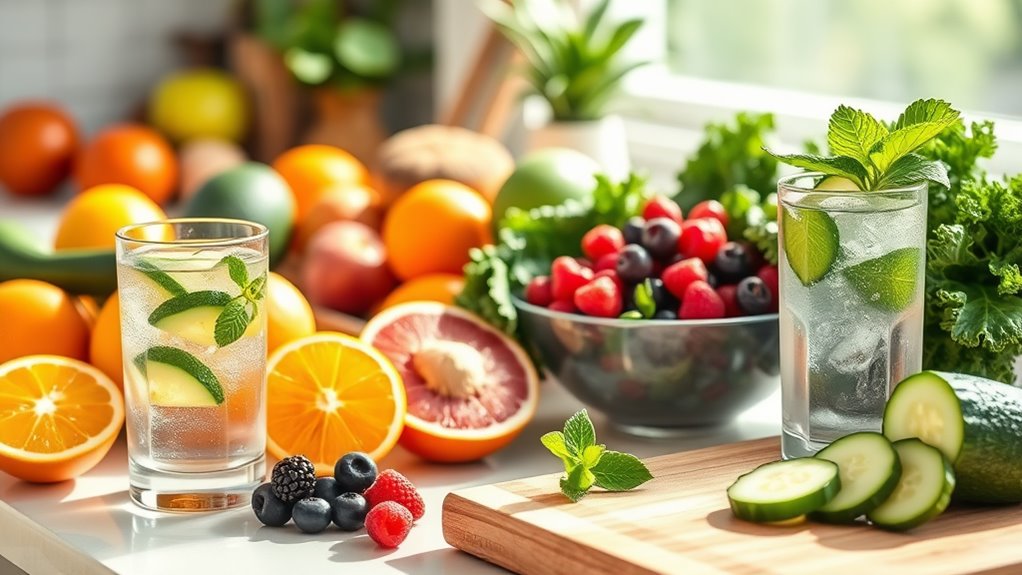Clear Skin Starts With the Right Nutrition-Here’s What to Eat
To achieve clear skin, you need to focus on the right nutrition. Antioxidant-rich foods play a crucial role in combating free radicals, while essential fatty acids help keep your skin hydrated. Vitamins and minerals are equally important for maintaining clarity and preventing breakouts. But hydration goes beyond just drinking water; it involves the right food choices too. Curious about which specific foods can make a significant difference?
The Role of Antioxidants in Skin Health
Antioxidants play a crucial role in maintaining healthy skin by neutralizing free radicals, which can cause premature aging and damage.
To promote clear skin, you should incorporate antioxidant-rich foods into your diet.
Berries, spinach, nuts, and dark chocolate are excellent choices that combat oxidative stress.
Vitamin C, found in citrus fruits, enhances collagen production, vital for skin elasticity.
Including these clear skin foods not only improves your skin’s appearance but also supports overall health. Additionally, incorporating nutrient-rich foods into your meals can further enhance skin vitality.
Essential Fatty Acids for Hydrated Skin
Essential fatty acids (EFAs) are crucial for maintaining hydrated skin, and you can find them in sources like fish, flaxseeds, and walnuts.
These nutrients help strengthen your skin’s barrier, preventing moisture loss and keeping your complexion plump. Incorporating EFAs into your diet can significantly enhance your skin’s hydration levels and overall appearance. Additionally, consuming nutrient-rich foods can further support your skin’s health and radiance.
Sources of Essential Fatty Acids
A variety of foods can provide your body with essential fatty acids (EFAs), crucial for maintaining hydrated and healthy skin. Including sources rich in EFAs in your diet is key. Here are some excellent options to consider:
| Food Source | Type of EFA | Suggested Serving Size |
|---|---|---|
| Flaxseed | Alpha-Linolenic Acid | 1 tablespoon |
| Walnuts | Alpha-Linolenic Acid | ¼ cup |
| Salmon | Omega-3 Fatty Acids | 3 ounces |
| Chia Seeds | Alpha-Linolenic Acid | 2 tablespoons |
Incorporate these foods for optimal skin hydration and health.
Benefits for Skin Hydration
Including sources of essential fatty acids in your diet not only supports overall health but also plays a vital role in skin hydration.
These fatty acids help maintain your skin’s lipid barrier, preventing moisture loss and keeping your skin plump and supple.
Omega-3 and omega-6 fatty acids, found in fish, flaxseeds, and walnuts, can reduce inflammation and improve skin texture.
Incorporating these foods into your meals enhances your skin’s ability to retain water, leading to a healthier, more radiant appearance.
Aim for a balanced diet rich in these nutrients to promote optimal skin hydration and overall well-being.
Vitamins and Minerals That Promote Clarity
The right vitamins and minerals can significantly enhance your skin’s clarity and overall health.
Vitamin A helps regulate skin cell production, reducing acne and promoting a smooth texture. Vitamin C is crucial for collagen synthesis, aiding in skin repair and brightness. Zinc supports immune function, preventing breakouts by reducing inflammation.
Omega-3 fatty acids, found in fish and flaxseeds, can help maintain skin’s moisture barrier. Additionally, B vitamins, especially B6 and biotin, improve skin health by supporting energy metabolism. Consuming a balanced diet rich in skin-beneficial foods can further amplify these positive effects.
Incorporating these nutrients into your diet can lead to a clearer, healthier complexion and boost your confidence in your skin.
The Importance of Hydration for Skin
Staying hydrated is vital for maintaining healthy skin, as water intake directly impacts skin elasticity and appearance. When you’re dehydrated, your skin can become dry, dull, and more prone to wrinkles. Prioritizing hydration not only improves your complexion but also supports your skin’s overall function. Incorporating natural detox drinks into your routine can further enhance hydration and help flush out toxins that affect skin health.
Role of Water Intake
Hydration plays a crucial role in maintaining healthy skin, and it’s easy to overlook just how vital water intake is for your complexion.
Drinking enough water helps to flush out toxins, reducing the likelihood of breakouts and dullness. When you’re well-hydrated, your skin appears plumper and more radiant.
Aim for at least eight 8-ounce glasses of water daily, but adjust based on your activity level and climate.
Incorporating water-rich foods like cucumbers and oranges can also boost your hydration.
Hydration and Skin Elasticity
Maintaining optimal hydration not only enhances your skin’s appearance but also plays a significant role in its elasticity.
When you’re well-hydrated, your skin retains moisture, which helps maintain its firmness and suppleness. Dehydrated skin can lead to a loss of collagen and elastin, crucial proteins for skin resilience.
To support your skin’s elasticity, aim to consume water-rich foods like cucumbers, oranges, and leafy greens.
Regularly drinking water throughout the day also keeps your skin plump and youthful.
Effects of Dehydration
Have you ever noticed how your skin changes when you’re not drinking enough water?
Dehydration can lead to a range of negative effects on your skin, making it essential to prioritize hydration.
When you’re not adequately hydrated, your skin may:
- Appear dull and lifeless
- Develop fine lines and wrinkles
- Experience increased dryness and flakiness
- Be more prone to irritation and breakouts
Foods to Reduce Inflammation
What if the key to clearer skin lies in the foods you choose? Reducing inflammation is crucial for achieving that glow.
Incorporate foods rich in omega-3 fatty acids, like salmon and walnuts, to combat inflammation effectively.
Colorful fruits and vegetables, particularly berries and leafy greens, provide antioxidants that fight skin irritants.
Additionally, spices like turmeric and ginger can help reduce inflammation.
Don’t forget about healthy fats from olive oil and avocados, which can also support skin health. Including nutrient-rich foods in your diet can lead to a more youthful appearance and improved skin vitality.
Probiotics and Gut Health Connection
How can a healthy gut lead to clearer skin?
The gut-skin connection is real; a balanced microbiome supports skin health. Probiotics can enhance this balance, helping to reduce inflammation and promote a radiant complexion. Incorporating these foods into your diet can work wonders:
- Yogurt: Rich in live cultures that boost gut health.
- Kefir: A fermented drink that’s packed with probiotics.
- Sauerkraut: Fermented cabbage that’s great for digestion.
- Kimchi: Spicy fermented veggies that support gut flora.
Additionally, a diet rich in anti-bloating detox foods can significantly improve overall gut health, further contributing to a clearer complexion.
Balancing Sugar Intake for Clear Skin
Managing your sugar intake can significantly impact your skin’s clarity. High sugar consumption can lead to insulin spikes, which may trigger inflammation and breakouts.
To promote clear skin, aim to reduce refined sugars found in sweets, sodas, and white bread. Instead, focus on complex carbohydrates like whole grains, fruits, and vegetables.
These options provide essential nutrients without causing rapid blood sugar fluctuations.
Additionally, consider incorporating anti-inflammatory foods such as berries, nuts, and fatty fish into your diet.

